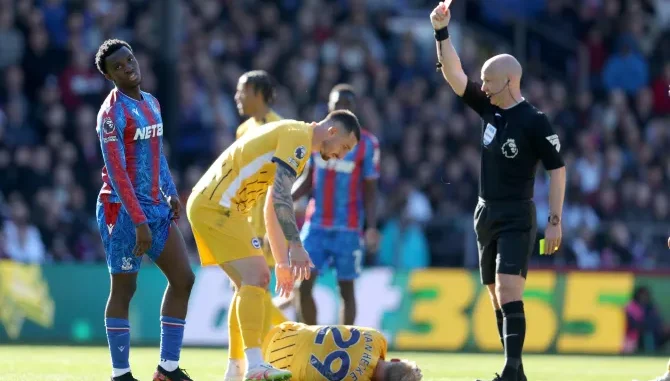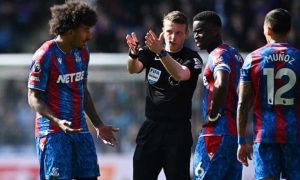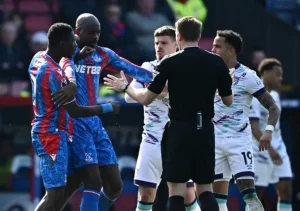
In what promises to be one of the most significant disciplinary changes in recent Premier League history, a new rule will be introduced for the 2025/26 season, limiting referee communication strictly to club captains during matches. The move is designed to restore order on the pitch and reduce dissent, but it has already stirred conversation across the footballing world, with Crystal Palace and other Premier League clubs expected to be among the first to feel the pressure of this shift.
According to reports, the Premier League’s annual general meeting, set for next month, will see representatives from all 20 clubs formally approve the introduction of the new regulation, which has already proven effective in UEFA competitions since EURO 2024.
The Professional Game Match Officials Limited (PGMOL) has expressed strong support for the move, pushing for its expansion beyond the Premier League to the Football League and encouraging similar adoption across all tiers of English football. The idea is not new, however. It originated from the International Football Association Board (IFAB), which recommended the change in November 2023 to curb aggressive player behavior toward match officials.

Under the new directive, only the designated team captain will be allowed to approach the referee for clarification or discussion during a match. Other players will be expected to refrain from crowding the officials or engaging in argument. Failure to comply will result in immediate yellow cards for dissent.
The regulation does provide a caveat for teams with goalkeeper captains — a scenario not uncommon in the Premier League. In such cases, clubs may assign a secondary outfield player to act as the team’s official communication representative during games.
UEFA, which has already implemented this rule across its three major club competitions, explained:
“This information and accompanying explanations are provided only to the team captains, who are the only players entitled to speak to the referee and request clarifications in a respectful manner.”
They added further responsibility on captains:

“Captains must also take responsibility for their team-mates, asking them to respect the referee, keep their distance, and not surround the match officials.”
The move is being welcomed by match officials who argue that it enables them to “explain decisions rather than justify them.” This nuance has proved important in managing tempers during contentious moments on the pitch, particularly during tight fixtures or controversial decisions.
Critics, however, warn that the rule may be difficult to enforce consistently and could place undue pressure on captains who will now bear the burden of relaying all key information. Players like Marc Guehi at Crystal Palace, should he retain the armband next season, would now need to act as both tactical leaders and emotional stabilizers under high-pressure circumstances.
Crystal Palace are among the clubs that may feel the immediate impact of this regulation. Known for their intense, passionate style of play, especially under high-stakes situations as seen in their recent FA Cup triumph, Palace players often react emotionally to officiating decisions. The new rule will now force a change in behavior, making discipline and on-field leadership more crucial than ever.
Club sources suggest that the Eagles are already preparing their squad for the adjustment, with coaching staff set to emphasize emotional intelligence and controlled communication during pre-season.

As the Premier League continues its push for greater fairness, discipline, and clarity in officiating, this new rule represents a bold and potentially transformative step. While some fans and pundits may see it as restrictive, others view it as a necessary evolution in modern football, mirroring the game’s progression on the European stage.
One thing is certain: come August 2025, captains will not only lead in spirit but now also serve as the sole voice of the team — a role that could define matches, shape careers, and even influence title races.
Leave a Reply